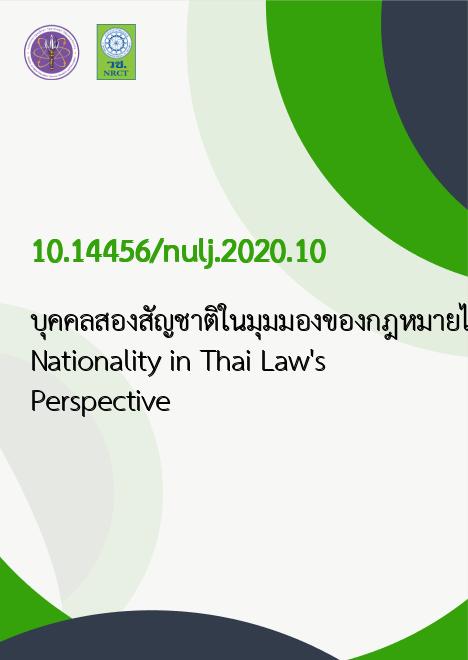
|
บุคคลสองสัญชาติในมุมมองของกฎหมายไทยDual Nationality in Thai Law's Perspective |
|---|---|
| รหัสดีโอไอ | |
| Creator | กัณภัค ตัณฑสิทธิ์ |
| Title | บุคคลสองสัญชาติในมุมมองของกฎหมายไทยDual Nationality in Thai Law's Perspective |
| Publisher | คณะนิติศาสตร์ มหาวิทยาลัยนเรศวร |
| Publication Year | 2563 |
| Journal Title | วารสารนิติศาสตร์ มหาวิทยาลัยนเรศวร |
| Journal Vol. | 13 |
| Journal No. | 2 |
| Page no. | 49-71 |
| Keyword | บุคคลสองสัญชาติ, การได้สัญชาติ, การแปลงสัญชาติ, การสละสัญชาติ, พระราชบัญญัติสัญชาติ พ.ศ.2508, Dual nationality, Acquisition of Nationality, Nationalization, Renunciation of Nationality, Nationality Act, B.E. 2508 |
| URL Website | https://www.tci-thaijo.org/index.php/lawnujournal/index |
| Website title | https://so04.tci-thaijo.org/index.php/lawnujournal/article/view/242281 |
| ISSN | 1906425X (Print), 24653829(Online) |
| Abstract | กฎหมายระหว่างประเทศยอมรับว่าการที่รัฐกำหนดสัญชาติให้แก่บุคคลในสังกัดของรัฐเป็นกิจการภายในของรัฐ รัฐแต่ละรัฐเป็นผู้กำหนดการได้มาและสูญเสียไปของสัญชาติของบุคคลซึ่งเป็นคนชาติของตน โดยรัฐอื่นจะเข้าไปสอดแทรกมิได้ ดังนั้นเมื่อเกิดการทับซ้อนของเกณฑ์การให้สัญชาติของแต่ละรัฐ จึงทำให้เกิดบุคคลสองสัญชาติขึ้นมาได้การพิจารณาให้สัญชาติตามกฎหมายไทยบุคคลจะได้สัญชาติเมื่อเกิดตามหลักสืบสายโลหิต (jus sanguinis) และหลักดินแดน (jus soli) และอาจได้สัญชาติภายหลังจากการเกิดโดยการสมรส หรือการแปลงสัญชาติ ซึ่งอาจทำให้เกิดบุคคลสองสัญชาติขึ้นมาได้ เนื่องจากกฎหมายไทยไม่ได้มีบทบัญญัติห้ามถือสองสัญชาติบทความนี้ จึงมุ่งศึกษาเกี่ยวกับบุคคลสองสัญชาติภายใต้มุมมองของกฎหมายไทย โดยแสดงให้เห็นถึงหลักกฎหมายไทยเกี่ยวกับสัญชาติ นำเสนอปัญหา และข้อเท็จจริงที่เกิดขึ้นในประเทศไทย และมีข้อเสนอแนะให้แก้ไขพระราชบัญญัติสัญชาติ พ.ศ.2508 เพื่อป้องกันไม่ให้เกิดบุคคลสองสัญชาติจากการเกิดและการแปลงสัญชาติInternational law has duly recognized that a state is allowed to provide its citizens with nationality in term of the reserved domain. In other words, each state is capable of acquisition and renunciation of nationality for its own citizens without any kind of intervention made by other states. Hence, whenever there is overlapping criteria governing acquisition of nationality, this leads to the status of dual nationality with the state.In considering nationality under Thai law, a person acquires nationality by birth according to the principle of jus sanguinis and jus soli; or after birth by marriage or nationalization. Which may cause dual nationality because Thai law does not have provision that prohibit dual nationality.This article aims to study about dual nationality under the perspective of Thai law where by demonstrating Thai law's provisions regarding nationality, presenting related problems and facts that still occurs particularly in Thailand. And, giving suggestions to amend Nationality Act, B.E. 2508 for preventing dual nationality by birth and nationalization. |